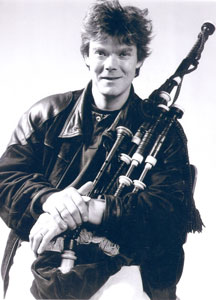 Gordon Duncan was one of the greatest-ever exponents of the bagpipes, a fearlessly innovative and deeply expressive musician and a prolific composer, many of whose tunes have attained the ultimate accolade of having passed into the tradition.
Gordon Duncan was one of the greatest-ever exponents of the bagpipes, a fearlessly innovative and deeply expressive musician and a prolific composer, many of whose tunes have attained the ultimate accolade of having passed into the tradition.
Born in Pitlochry on May 14, 1964, Gordon grew up in a family that was steeped in Scotland’s musical traditions. His father, Jock, is one of the great traditional ballad and bothy ballad singers and his older brother, Ian, is a hugely respected figure on the piping scene both as a teacher and as the pipe major who has masterminded competition successes for leading bands including The Vale of Atholl, Scottish Power and Kirkliston pipe bands, in all of which Gordon also served.
Gordon began playing the chanter under Ian’s tutelage at the age of ten and instantly became inseparable from the instrument. Before he set off for school every morning he would practice, developing the finger strength and dexterity that would later allow him to play so intricately. In his teens he competed in junior piping competitions, bringing home armfuls of trophies, but when he turned eighteen competing lost much of its attraction.
By this time he was serving his apprenticeship as a joiner and beginning to attract the attention of bands including the Tannahill Weavers, with whom he toured America for the first time. He also began a lasting association with singer-songwriter Dougie Maclean, playing pipes and whistle on many of Maclean’s albums and tours, and toured with groups including Wolfstone and Ceolbeg.
Travelling across Europe exposed Gordon to other traditions and he became fascinated with Breton music and musicians. The attraction was mutual. Gordon won the coveted Macallan solo piping trophy in Lorient, Brittany two years in succession and became a hero among young Breton pipers who learned the tunes on Gordon’s three CDs for Greentrax Recordings grace note for grace note.
These tunes included Gordon’s bagpipes setting of AC/DC’s heavy rock anthem Thunderstruck which he unleashed during Edinburgh International Festival’s 1999 Piping Series, a performance that ultimately won him a Herald Angel award from Scotland’s leading newspaper in recognition of artistic excellence during Edinburgh’s festival season.
Gordon’s own compositions including Andy Renwick’s Ferret, which has featured on more than one hundred commercial recordings, The Famous Baravan and The Sleeping Tune have been collected into a tune book that is regarded as a bible by young traditional musicians. He died on December 14, 2005 but his memory lives on through his music, through the many stories of his exploits, such as the time he appeared on an airport security X-Ray screen as a whistle-playing skeleton, and through the Gordon Duncan Trust, which encourages young musicians to follow in Gordon’s musical footsteps and stages a popular celebration of his legacy in Perth Concert Hall every September.
His family remain justifiably proud of this genius musician and singular character, none more so than Gordon’s brother, Ian, who started Gordon off on a journey that spread his reputation around the world and who delights in being introduced in country and after country as Gordon Duncan’s brother.